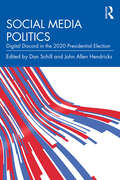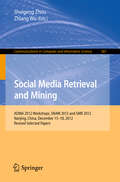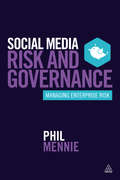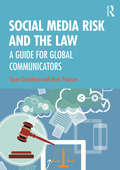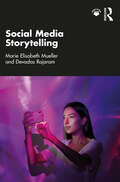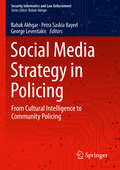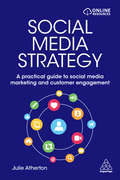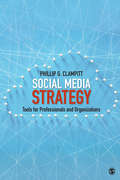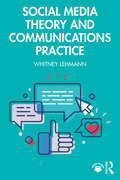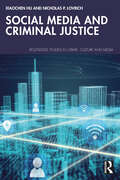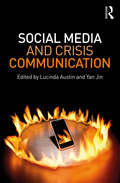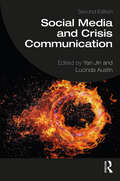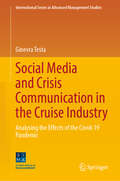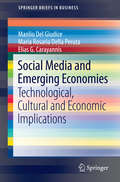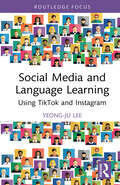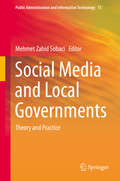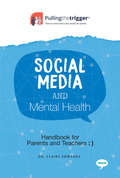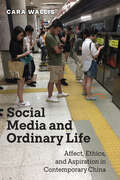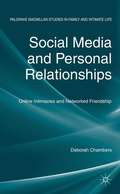- Table View
- List View
Social Media Politics: Digital Discord in the 2020 Presidential Election
by John Allen Hendricks Dan SchillSocial media and social networking services are integrated into the American political process and have profoundly influenced political communication and participation. Social media platforms have transformed the political landscape by revolutionizing information dissemination, citizen engagement, and public opinion formation and change. Politicians use social media to communicate directly with voters in an unmediated and unfiltered manner. Comparatively, voters use social media to follow the latest messaging from politicians accompanied by demonstrating their support for particular politicians. This book is a comprehensive examination of the role of digital and social media in the 2020 U.S. presidential election. Political discourse during the 2020 election revealed political disharmony and a deep political division among vast swaths of Americans that was powered, in part, by social media. This book reveals how digital and social media have reshaped power dynamics by altering the relationships among citizens, politicians, and traditional media outlets, the emergence of new influencers, and the impact of online activism on policy agendas.This book, Social Media Politics, includes scholars with varied backgrounds and experience, using both quantitative and qualitative methodologies, from leading research institutions around the nation. Students, scholars, and practitioners will gain new knowledge to more clearly understand the role social media played in the 2020 presidential campaign.
Social Media Retrieval and Mining
by Shuigeng Zhou Zhiang WuThis book constitutes the refereed proceedings of the ADMA 2012 Workshops: The International Workshop on Social Network Analysis and Mining, SNAM 2012, and the International Workshop on Social Media Mining, Retrieval and Recommendation Technologies, SMR 2012, Nanjing, China, in December 2012. The 15 revised full papers presented were carefully reviewed and selected from numerous submissions. The papers are organized in topical sections on networks and graphs processing; social Web; social information diffusion; social image retrieval and visualization.
Social Media Risk and Governance
by Phil MennieFew topics are as pressing to policy makers, business leaders and the risk management community as the secure and compliant management of social media. Social Media Risk and Governance is a practical guide to the components and considerations which make up a good social media governance strategy, spanning both external communications channels such as Facebook, Twitter and LinkedIn, as well as enterprise social networks within an organization. Written by social media risk and governance expert Phil Mennie, Social Media Risk and Governance addresses the concepts professionals in information security, marketing, compliance and risk management need to take into account in their daily practice, guiding us through policy evaluation, planning on social media, information security and fraud risks, how to respond to a crisis or to archive data and more. Featuring examples from companies such as BP, MasterCard, Netflix, PwC, Silk Road UBS and Yelp, the book is designed to promote cross-functional working between professional users of social media, acknowledging the impact of these technologies across the business and the interaction of the various stakeholders when planning new activities to effectively harness the power of social media safely and successfully for their organization.
Social Media Risk and the Law: A Guide for Global Communicators
by Mark Pearson Susan GranthamSocial media has many advantages for professional communication – but it also carries considerable risks, including legal pitfalls. This book equips students and communication professionals with the knowledge and skills to help minimise the risks that can arise when they post or host on social media. It offers them strategies for taking advantage of the opportunities of social media while also navigating the ethical, legal, and organisational risks that can lead to audience outrage, brand damage, expensive litigation and communication crises. The book uses stakeholder theory and risk analysis tools to anticipate, identify, address and balance these opportunities and risks. It takes a global approach to risk and social media law, drawing on fascinating case studies from key international jurisdictions to explain and illustrate the basic principles. Whether you are a corporate communicator, social media manager, journalist, marketer, blogger or student you will find this book an essential addition to your professional library as the first reference point when social media and legal risks arise.
Social Media Storms: Empowering Leadership Beyond Crisis Management
by Pernille Rydén Muhammad Ismail Hossain Efthymia Kottika Vatroslav ŠkareThis fascinating new book explores the benefits and dynamics of social media storms and identifies the possible opportunities that they present for further engagement with customers. It provides actionable managerial advice on planning for, measuring, and innovatively navigating social media storms. Based on a sound theoretical background and illustrated by vivid real-life examples and case studies throughout every chapter, this book combines thorough explanations of the elements of business decision-making, market interaction, consumer psychology, branding, and business communication. In comparison to the existing literature, the book departs from the classical, but insufficient crisis communication management approaches to suggest novel frameworks and tools for empowering businesses, consumers, and broader societies in the digital age. Social Media Storms: Empowering Leadership Beyond Crisis Management provides advanced undergraduate and postgraduate digital marketing, marketing communications, strategy, and crisis management students with a comprehensive understanding of the social media storm phenomenon and helps marketing and communications professionals to leverage the opportunities that social media storms are bringing.
Social Media Storytelling
by Marie Elisabeth Mueller Devadas RajaramOffering a radical new toolbox for digital storytellers, this key text contains everything today’s media practitioners need to know about conceptualising, editing and producing stories for online platforms and audiences. This book teaches readers practical skills for increasing their reach online, strengthening their personal brand and improving follower counts across the social web, including main platforms such as Twitter, Snapchat, TikTok, Instagram and Facebook. Encouraging a DIY approach, the authors guide readers through various platforms and reveal which are best suited to their users and how to customise stories for different channels. Topics covered include storytelling with smartphones (iOS and Android), storyboarding, framing, sequencing, shooting and editing high-quality content, and evaluating the success of content and campaigns. Contributions from five industry experts expand on privacy, community building and collaboration. The book concludes by looking to the future of social media storytelling, with industry professionals offering predictions for trends to watch out for. Social Media Storytelling is an essential resource for students of mobile and multimedia journalism, digital media and media marketing, as well as for professionals who want to learn how to create compelling content and tell impactful brand stories. The book also features accompanying online exercises.
Social Media Strategy in Policing: From Cultural Intelligence to Community Policing (Security Informatics and Law Enforcement)
by Babak Akhgar Petra Saskia Bayerl George LeventakisThis book addresses conceptual and practical issues pertinent to the creation and realization of social media strategies within law enforcement agencies. The book provides readers with practical methods, frameworks, and structures for understanding social media discourses within the operational remit of police forces and first responders in communities and areas of concern. This title - bridging the gap in social media and policing literature - explores and explains the role social media can play as a communication, investigation, and direct engagement tool. It is authored by a rich mix of global contributors from across the landscape of academia, policing and experts in government policy and private industry. Presents an applied look into social media strategies within law enforcement;Explores the latest developments in social media as it relates to community policing and cultural intelligence; Includes contributions and case studies from global leaders in academia, industry, and government.
Social Media Strategy: A Practical Guide to Social Media Marketing and Customer Engagement
by Julie AthertonSocial Media Strategy provides a simple, structured way to create integrated customer engagement and social media campaigns that work. Organizations often talk of digital planning but struggle to know which channels to invest in, how to integrate them with content marketing activity, or fail to develop measurable outputs that align with business objectives. This book provides a clear road map for efficient planning, deliverance and financial accountability of social media's contribution to the business.Social Media Strategy delivers practical guidance such as identifying and targeting audience segments, methods of two-way community engagement, reputation management, being present on the right channels, and driving action through influencers. It also identifies the relevant tools and platforms to audit, track and measure business impact and customer engagement. With example templates, interviews and global case studies including National Geographic, TUI, Dreams Beds and Tiny Giant, this professional guide delivers a long-term solution for maximizing social media led business development.
Social Media Strategy: Tools for Professionals and Organizations
by Phillip G. Clampitt"Finally, a social media text that combines liberal arts and social science intellectualism with practical, real-world tips for success in this crucial aspect of professional communications. Its value goes beyond the classroom – everything in the book will resonate with and be useful to PR pros already engaged in social media management." —Ray Begovich, Franklin College Social Media Strategy: Tools for Professionals and Organizations shows professionals and organizations how to use social media more effectively and strategically. With a focus on what makes social media unique among communication platforms, this book offers practical guidance on creating, implementing, and evaluating social media strategies and tactics. Social media is constantly evolving, so the book focuses on enduring strategic principles and uses case studies and exercises throughout to help readers build the fundamental competencies needed by today’s social media managers.
Social Media Strategy: Tools for Professionals and Organizations
by Phillip G. Clampitt"Finally, a social media text that combines liberal arts and social science intellectualism with practical, real-world tips for success in this crucial aspect of professional communications. Its value goes beyond the classroom – everything in the book will resonate with and be useful to PR pros already engaged in social media management." —Ray Begovich, Franklin College Social Media Strategy: Tools for Professionals and Organizations shows professionals and organizations how to use social media more effectively and strategically. With a focus on what makes social media unique among communication platforms, this book offers practical guidance on creating, implementing, and evaluating social media strategies and tactics. Social media is constantly evolving, so the book focuses on enduring strategic principles and uses case studies and exercises throughout to help readers build the fundamental competencies needed by today’s social media managers.
Social Media Success for Every Brand: The Five Pillars That Turn Posts into Profits (The StoryBrand Guides)
by Claire Diaz-OrtizBased on Donald Miller&’s bestselling book?Building a StoryBrand, Claire Diaz-Ortiz applies the seven principles of the StoryBrand Framework to help you build an effective, long-lasting social media plan for your brand.Most business owners are blindly guessing at their social media strategy, and it&’s costing them time and money. This book teaches you how to incorporate the StoryBrand 7-Part Framework into their social media channels to increase engagement and see better results.In Social Media Success for Every Brand, you will understand exactly what they need to do with their social media to drive growth to their organization through the practical guidance of the five-point SHARE model:StoryHowAudienceReachExcellenceSocial Media Success for Every Brand does not require you to be familiar with?Building a StoryBrand,?but provides enough foundation to prepare you for practical success with their social media content.Together with the StoryBrand Framework, Claire&’s SHARE model will help boost customer engagement and grow the organization&’s brand awareness and revenues.
Social Media Theory and Communications Practice
by Whitney LehmannFusing the academic with the applied, this book provides a comprehensive introduction to social media for future communications professionals. While most social media texts approach the subject through either a theoretical, scholarly lens or a professional, practical lens, this text offers a much-needed linkage of theory to the practical tactics employed by social media communicators. Concise and conversational chapters break down the basics of both social media theory and practice and are complemented by sidebars written by scholars and industry professionals, chapter summaries and end-of-chapter exercises. This book is ideal for introductory social media courses in communication, public relations and mass communication departments, as well as courses in digital media and public relations. Online resources include social media writing templates, sample posts and content calendar templates. Please visit www.routledge.com/9781032185873.
Social Media Theory and Communications Practice
by Whitney LehmannFusing the academic with the applied, this book provides a comprehensive introduction to social media for future communications professionals.While most social media texts approach the subject through either a theoretical, scholarly lens or a professional, practical lens, this text offers a much-needed linkage of theory to the practical tactics employed by social media communicators. Concise and conversational chapters break down the basics of both social media theory and practice and are complemented by sidebars written by scholars and industry professionals, chapter summaries and end-of-chapter exercises.This book is ideal for introductory social media courses in communication, public relations and mass communication departments, as well as courses in digital media and public relations.Online resources include social media writing templates, sample posts and content calendar templates. Please visit www.routledge.com/9781032185873.
Social Media and Criminal Justice (Routledge Studies in Crime, Culture and Media)
by Nicholas P. Lovrich Xiaochen HuDiscussing social media-related scholarship found in criminology, legal studies, policing, courts, corrections, victimization, and crime prevention, this book presents the current state of our knowledge on the impact of social media and the major sociological frameworks employed to study the U.S. justice system.Building a theoretical framework for the study of social media and criminal justice in each chapter, the chapters provide a systematic reflection of extant research on social media in cybercrime, operations of courts, administration of institutional and community corrections, law enforcement, and crime prevention. The book fills the gap between the contemporary state of knowledge regarding social media and criminal justice with respect to both empirical evidence and types of sociological frameworks being employed to explore and identify the societal costs and benefits of our growing dependence upon social media. In addition to providing an up-to-date overview of our current state of knowledge, this book highlights important areas of future research, wherein the benefits of social media can be expanded and the negative aspects of its broadening use can be minimized.Social Media and Criminal Justice will be of interest to students, scholars and practitioners in the areas of judicial administration, corrections management, law enforcement, and criminal justice-engaged community-based nonprofit organizations involved in court-referred treatment and/or active collaboration with local law enforcement agencies.
Social Media and Crisis Communication
by Lucinda L. Austin Yan JinSocial Media and Crisis Communication provides a unique and timely contribution to the field of crisis communication by addressing how social media are influencing the practice of crisis communication. The book, with a collection of chapters contributed by leading communication researchers, covers the current and emerging interplay of social media and crisis communication, recent theories and frameworks, overviews of dominant research streams, applications in specific crisis areas, and future directions. Both the theoretical and the practical are discussed, providing a volume that appeals to both academic-minded readers as well as professionals at the managerial, decision-making level. The audience includes public relations and corporate communication scholars, graduate students studying social media and crisis communication, researchers, crisis managers working in communication departments, and business leaders who make strategic business communication planning. No other volume has provided the overarching synthesis of information regarding the field of crisis communication and social media that this book contains. Incorporated in this volume is the recent Social-mediated Crisis Communication Model developed by the editors and their co-authors, which serves as a framework for crisis and issues management in a rapidly evolving media landscape.
Social Media and Crisis Communication
by Yan JinThe second edition of this vital text integrates theory, research, and application to orient readers to the latest thinking about the role of social media in crisis communication. Specific crisis arenas such as health, corporate, nonprofit, religious, political, and disaster are examined in depth, along with social media platforms and newer technology. Social Media and Crisis Communication, Second Edition provides a fresh look at the role of visual communication in social media and a more global review of social media and crisis communication literature. With an enhanced focus on the ethics section, a short communication overview piece, and case studies for each area of application, it is practical for use in a variety of learning settings. A must-read for scholars, advanced students, and practitioners who wish to stay on the leading edge of research, this book will appeal to those in public relations, strategic communications, corporate communications, government and NGO communications, and emergency and disaster response.
Social Media and Crisis Communication in the Cruise Industry: Analysing the Effects of the Covid-19 Pandemic (International Series in Advanced Management Studies)
by Ginevra TestaThis academic monograph examines the crisis communication response strategies employed by the cruise industry on social media following the COVID-19 pandemic. Focusing on social media platform X, the author conducted a content analysis of the top three cruise lines' strategies using NVivo software and assessed public sentiment and emotions through comments using KNIME and R software. The findings identify the most effective strategies for generating positive public sentiment and favourable emotions, contributing to faster business recovery. The book enhances Situational Crisis Communication Theory and offers practical guidance for managers to improve crisis resilience in the face of crises of such magnitude and duration. This work uniquely combines corporate and consumer perspectives to assess the effectiveness of crisis communication.
Social Media and Electronic Commerce Law
by Alan DavidsonThe ever-evolving nature of electronic commerce and social media continues to challenge the capacity of the courts to respond to privacy and security violations in 'cyberlaw'. Social Media and Electronic Commerce Law is designed to provide students and legal practitioners with a thorough and engaging exploration of the laws, regulations and grey areas of commerce via online platforms. This new edition has been thoroughly revised to address changes in legislation and recent court judgments, and to reflect the dynamic sphere of social media. New chapters focus on internet and e-commerce law regarding social media, P2P file sharing, Cloud computing and workplace issues, with an emphasis on data security made particularly relevant by the proliferation of hacking incidents. Written in an accessible style, Social Media and Electronic Commerce Law investigates the challenges facing legal practitioners and commercial parties in this dynamic field, as well as the underlying legal theory that governs it.
Social Media and Emerging Economies
by Maria Rosaria Della Peruta Manlio Del Giudice Elias G. CarayannisHow have social media in emerging economies evolved differently from the rest of the world? According to studies and anecdotal evidence, innovations in the use of social media tools occur more frequently in emerging economies than they do in developed markets. The aim of this volume is to show that in emerging regions (such as China, India, and South America) where the participation of stakeholders in the circuit of social media is more active (i. e. , greater frequency of contacts and creativity in the elaboration of contents), organizations not only are involved in a set of exchange relations with other social actors but are also embedded in a network of dynamic relationships. The authors utilize social network analysis to determine how entrepreneurs in emerging economies identify their most beneficial social contacts and use those contacts to leverage the resources needed for their enterprises, revealing new insights on the process of business creation and economic development in the networked age.
Social Media and Hate (Routledge Focus on Communication and Society)
by Shakuntala Banaji Ramnath BhatUsing expert interviews and focus groups, this book investigates the theoretical and practical intersection of misinformation and social media hate in contemporary societies. Social Media and Hate argues that these phenomena, and the extreme violence and discrimination they initiate against targeted groups, are connected to the socio-political contexts, values and behaviours of users of social media platforms such as Facebook, TikTok, ShareChat, Instagram and WhatsApp. The argument moves from a theoretical discussion of the practices and consequences of sectarian hatred, through a methodological evaluation of quantitative and qualitative studies on this topic, to four qualitative case studies of social media hate, and its effects on groups, individuals and wider politics in India, Brazil, Myanmar and the UK. The technical, ideological and networked similarities and connections between social media hate against people of African and Asian descent, indigenous communities, Muslims, Dalits, dissenters, feminists, LGBTQIA communities, Rohingya and immigrants across the four contexts is highlighted, stressing the need for an equally systematic political response. This is an insightful text for scholars and academics in the fields of Cultural Studies, Community Psychology, Education, Journalism, Media and Communication Studies, Political Science, Social Anthropology, Social Psychology, and Sociology.
Social Media and Language Learning: Using TikTok and Instagram (Routledge Research in Language Education)
by Yeong-Ju LeeThis book explores creative uses of social media for informal language learning. It focuses on the underexplored area of how informal language learning adapts to technological innovations in two multimodal media-sharing platforms: TikTok and Instagram.Drawing on ecological perspectives of language learning and spatial understandings of digital technology and learning, the research reported in this book unpacks how social media technologies are used for language learning. It presents insights from a dual-level qualitative methodological design: a comparative study of public online data of social media posts collected from TikTok and Instagram, and a multiple case study based on ethnographic narrative data gathered from participants’ journal entries, stimulated recall interviews, and social media posts. This book reveals the dynamic landscape of digital language learning that is being integrated into learners’ everyday lives through multimodal content creation and networking.This book enriches readers’ understanding of social media’s role in language learning, and offers pedagogical strategies for teachers to integrate newer technologies and multimodal materials into language classrooms to enhance students’ learning experiences.
Social Media and Local Governments
by Mehmet Zahid SobaciToday, social media have attracted the attention of political actors and administrative institutions to inform citizens as a prerequisite of open and transparent administration, deliver public services, contact stakeholders, revitalize democracy, encourage the cross-agency cooperation, and contribute to knowledge management. In this context, the social media tools can contribute to the emergence of citizen-oriented, open, transparent and participatory public administration. Taking advantage of the opportunities offered by social media is not limited to central government. Local governments deploy internet-based innovative technologies that complement traditional methods in implementing different functions. This book focuses on the relationship between the local governments and social media, deals with the change that social media have caused in the organization, understanding of service provision, performance of local governments and in the relationships between local governments and their partners, and aims to advance our theoretical and empirical understanding of the growing use of social media by local governments. This book will be of interest to researchers and students in e-government, public administration, political science, communication, information science, and social media. Government officials and public managers will also find practical use recommendations for social media in several aspects of local governance
Social Media and Mental Health: Handbook for Parents and Teachers (Pulling the Trigger)
by Claire EdwardsSocial Media and Mental Health: Handbook for Parents and Teachers will help you navigate the tricky waters surrounding your child’s use of the internet. Written by Clare Edwards, a clinical psychologist experienced in the field of adolescent mental health, it will highlight the challenges of parenting in the digital age, and offer tips and advice on how to keep your children safe online. Most importantly, this quick and easy illustrated guide explores the impact of social media on children's mental health, providing tools for ensuring that your child has a healthy relationship with social media and the internet.
Social Media and Ordinary Life: Affect, Ethics, and Aspiration in Contemporary China (Critical Cultural Communication)
by Cara WallisHow Chinese citizens use social mediaFocusing on domestic workers, rural microentrepreneurs, disadvantaged young creatives, and young feminists, Social Media and Ordinary Life is a deeply moving ethnography of how digital media infrastructures and platforms are woven into the rhythms of ordinary, everyday life. In choosing to foreground marginalized groups and communities, Cara Wallis gently shifts our attention away from the world of “social media influencers” and tech-centric discourses of entrepreneurial lives towards a decidedly ambivalent terrain of routine life practices.Social Media and Ordinary Life argues that understanding these individual experiences of the everyday enables greater insight into larger transformations taking place in contemporary China. Through long-term ethnographic fieldwork across China, Wallis foregrounds the entanglement of affect, emotion, ordinary ethical decisions, and desires connected to social media as it is used for self-expression, self-representation, fights for equality, maintenance of community, and economic livelihood. Four case studies show how social media is integrated into the articulation of affects by a wide variety of “ordinary” Chinese subjects: disadvantaged young creatives who migrate to Beijing from rural areas and use social media to cultivate their personal aesthetics; micro-entrepreneurs in rural Shandong province, especially women whose affective ties to the patriarchal family constrain their use of technology for economic enhancement; domestic workers, all women, in urban homes who use social media to build community and construct themselves as ethical subjects; and young feminists spread across China who engage in various types of cultural production and deploy social media in their fight for gender equality, often facing social and/or political marginalization in the process.Amid daunting forces—big data, artificial intelligence, massive surveillance—this book centers the “small,” showing how structural inequality, the urban/rural divide, patriarchal gender norms, and generational differences lead to contradictory or ambivalent outcomes of technology use. Even so, for these individuals and many others, social media is deeply intertwined with aspirations for a better future.
Social Media and Personal Relationships
by Deborah ChambersThis book explores how digital communication generates new intimacies and meanings of friendship in a networked society, developing a theory of mediated intimacies to explain how social media contributes to dramatic changes in our ideas about personal relationships, through themes of self, youth, families, digital dating and online social capital.
